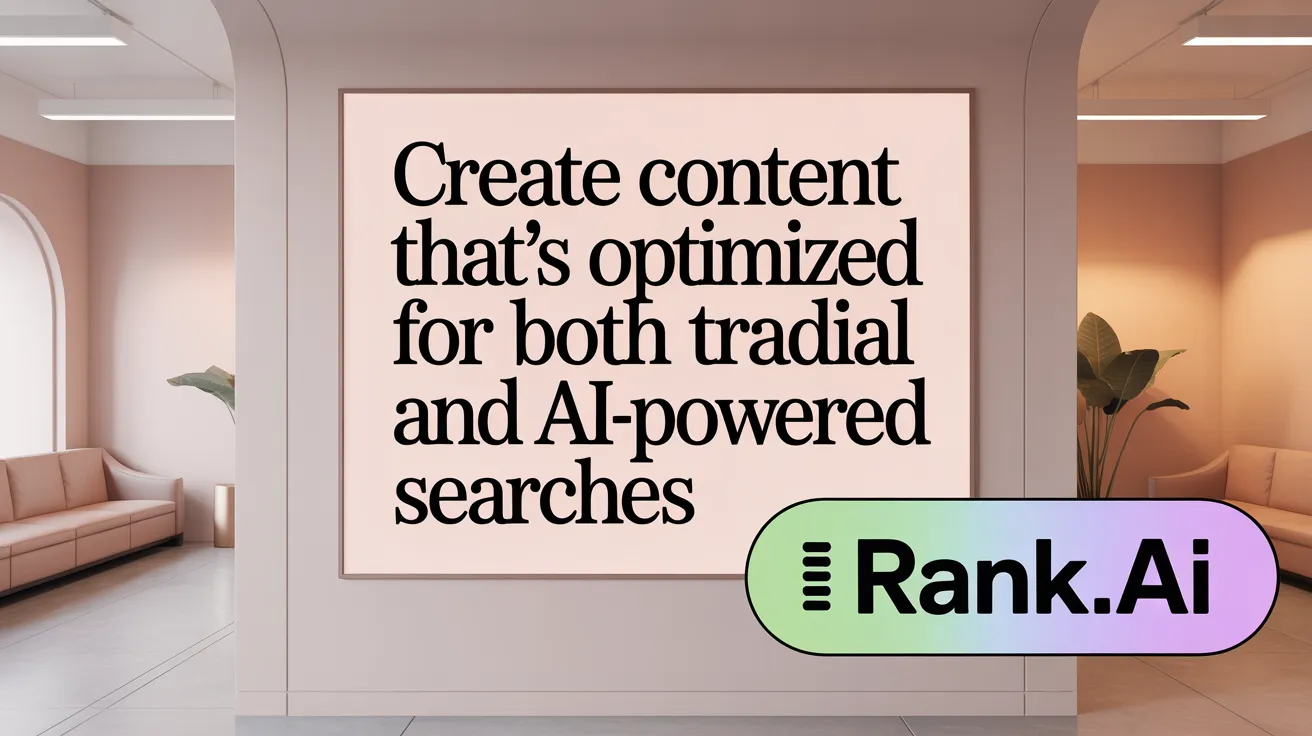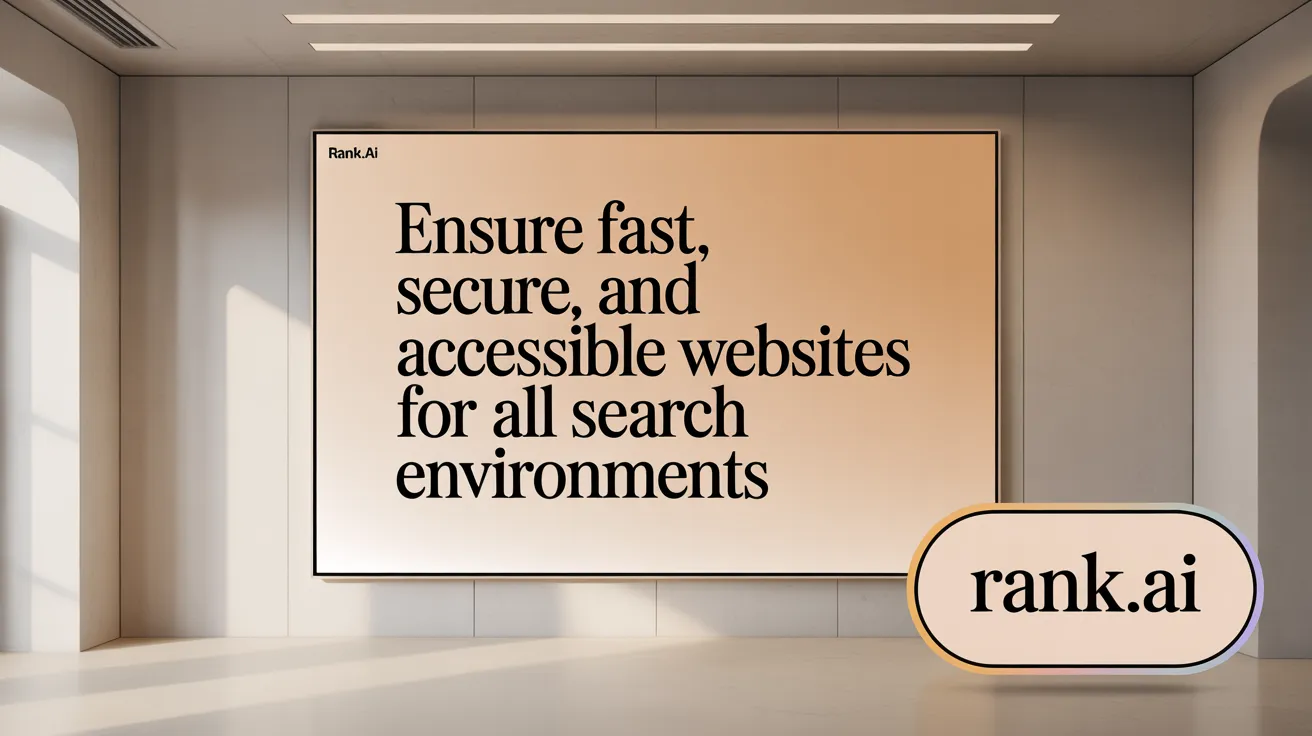Navigating the New SEO Landscape
The evolution of search engines driven by artificial intelligence is transforming how websites gain visibility and connect with users. While traditional Google SEO practices remain foundational, the rise of AI-driven search platforms demands a strategic overhaul. This article explores how SEO professionals and businesses can effectively align their strategies to maximize performance across both Google and AI-based search engines, ensuring sustainable and competitive digital presence.
Core Strategies for Harmonizing SEO Across Google and AI Search Engines

How can SEO strategies be optimized to perform well on both Google and AI-driven search engines?
Achieving success in both traditional Google search and emerging AI-driven search platforms requires a multifaceted approach. The foundation starts with creating high-quality, user-focused content that is easy to understand and directly addresses the specific questions users have. This means employing clear language, organized structures, and comprehensive coverage of topics, including FAQs and detailed explanations.
In addition, implementing semantic SEO techniques enhances how AI interprets your content. Using relevant keywords naturally, incorporating synonyms, and focusing on user intent helps AI models better understand the context of your pages. Structured data markup, such as FAQ schema, HowTo schema, or Product schema, further improves content visibility by enabling AI and search engines to extract and showcase information more effectively.
Technical SEO remains critical. Fast-loading pages, mobile responsiveness, secure connections via HTTPS, and error-free site architecture ensure that AI bots can crawl and index your site efficiently. Regular audits to maintain crawlability and implementing effective internal linking further boost your site's discoverability.
Adapting to the evolution of AI features like the Search Generative Experience (SGE) involves diversifying your content formats. Incorporating multimedia elements such as images and videos, along with well-structured, factual content, aligns well with AI’s preference for rich, multimodal data.
Leveraging AI-powered tools like ChatGPT for content ideation, Ahrefs or SEMrush for performance tracking, and schema markup validators can streamline your optimization process. These tools help identify opportunities, analyze your site’s health, and monitor AI-specific metrics like snippet appearances or voice search traffic.
Finally, stay informed on the latest AI developments and update your strategies accordingly. By combining traditional SEO best practices with innovative AI-centric tactics, you can boost your visibility on both Google and AI search engines, ensuring you reach your audience effectively across all platforms.
Best Practices for SEO Adaptation to Emerging AI-Driven Platforms

What are best practices and techniques for adapting SEO to emerging AI search platforms?
Adapting SEO to the new era of AI-driven search platforms requires a strategic shift from traditional methods to more sophisticated, content-focused approaches. High-quality, authoritative content sits at the core of this transition. Such content should thoroughly cover topics, provide accurate information, and utilize a clear hierarchy to guide both users and AI systems.
Semantic markup plays a vital role in helping AI understand and interpret page content. Implementing schema markup—such as FAQ, HowTo, and article tags—enables search engines to generate rich snippets and AI summaries. This structured data enhances your content’s visibility and relevance in AI-powered features.
Keeping content fresh and citing credible sources throughout your material boosts trustworthiness. Frequent updates on relevant topics, along with proper citations, signal that your site provides current, evidence-based information, which is favored by AI algorithms.
Effective multi-channel promotion, including social media, forums, and niche platforms, broadens reach and reinforces brand authority. Consistent presence across diverse channels helps AI recognize your site as a trustworthy authority and improves your chances of appearing in AI-generated answers.
Monitoring emerging questions and evolving search trends allows you to optimize content proactively. Utilizing AI-powered tools like ChatGPT, SEMrush, or Ahrefs for keyword research, content audits, and performance tracking helps tailor your strategy to conversational and semantic search models.
Investing in technical SEO essentials—such as fast-loading pages, mobile-friendliness, strong internal linking, and clean site architecture—ensures that AI crawlers can efficiently access, interpret, and rank your content.
In essence, the best practices for adapting SEO to AI platforms involve creating authoritative, well-structured, engaging content, supported by robust technical foundations and strategic promotion. This comprehensive approach positions your site to thrive in the evolving landscape of AI search engines and algorithms.
Optimizing Content for Dual Visibility: Google and AI Search Engines

How can content be optimized to rank well on both AI-driven search engines and traditional Google search results?
Creating content that appeals to both AI-powered search engines and classic Google search results involves a multi-layered approach. First, focus on producing high-quality, authoritative content that genuinely addresses user questions and intents. This means conducting thorough research, citing credible sources, and maintaining accuracy.
Semantic relevance is crucial. Align your content with specific keywords but also incorporate related concepts and natural language. This helps AI models understand context better and improves ranking somewhere in the top results.
Using structured data and schema markup, such as FAQ, HowTo, and product schemas, helps AI understand your content’s structure. These markup types can be included in your HTML to enhance your chances of appearing in rich snippets or AI summaries.
Technical accessibility plays a significant role. Make sure your website loads quickly, is mobile-friendly, and has a logical, easy-to-navigate structure. Fix broken links and ensure your site’s health to facilitate smooth crawling and indexing. Friendly URL structures and metadata include titles and descriptions optimized for search relevance.
Supporting your content with citations, authoritative sources, and recent updates builds trustworthiness, especially important for AI models that prioritize credible content. Regularly maintain and update your pages to reflect the latest information.
AI engines tend to favor content that is well-structured and easily interpretable. Adding clear headings, summaries, tables, and bullet points improves readability and AI comprehension.
In summary, to excel in both types of search results, implement a balanced approach: create high-quality content, align with user intent through semantic optimization, leverage schema markup, ensure technical health, and uphold trust through citations and updates. These strategies help your site remain competitive in the evolving landscape of AI-enhanced and traditional Google search.
Technical SEO Enhancements for Cross-Platform Search Visibility

What technical SEO adjustments can enhance visibility in both Google and AI search results?
Optimizing your website from a technical perspective is crucial for gaining prominence in both traditional and AI-driven search environments. First, focus on page speed optimization. Fast-loading pages improve user experience and are favored by search engines and AI algorithms alike. Use tools like Google PageSpeed Insights to identify and fix speed bottlenecks, including server response times and large image files.
Next, ensure your site is mobile-friendly. With more searches happening on mobile devices, responsive design not only improves user experience but also influences rankings. Test your site across devices and fix any layout issues to meet mobile usability standards.
Maintaining HTTPS security is another essential element. A secure, encrypted website reassures users and is prioritized in search results. Verify your SSL certificate and ensure all pages load securely.
Structured data validation cannot be overlooked. Implement schema markup using JSON-LD format for types such as FAQ, HowTo, and VideoObject. Validated schema boosts AI understanding of your content, increasing the chance of appearing in rich snippets and AI-generated summaries.
Supporting multimodal content—like high-quality images and videos—enhances content richness. Optimizing images with descriptive alt text and fast loading settings, along with hosting engaging videos, helps AI better interpret your content.
Search appearance management involves controlling how your pages are displayed in results. Use tools such as 'noindex' tags or meta descriptions strategically to influence snippets and AI summaries, ensuring your most valuable content is highlighted.
Finally, crawlability and indexability are foundational. Maintain a clean website structure with proper internal linking and an up-to-date XML sitemap. Ensure your site is free from crawl barriers like blocking JavaScript or images that hinder AI understanding, and regularly audit your site with tools like Google Search Console.
In summary, combining fast, secure, accessible, and well-structured websites with validated schema markup and supporting rich media ensures your content is optimized for diverse search platforms, including emerging AI features.
Staying Ahead: Monitoring and Adapting to AI-Driven SEO Trends

How can businesses keep up with evolving SEO trends influenced by AI technologies?
Keeping pace with AI-driven changes in search engine optimization requires a strategic and dynamic approach. Businesses need to stay informed about major developments like Google’s Search Generative Experience (SGE), AI Overviews, and new features that affect rankings and visibility.
One effective way is to closely monitor AI search trends and updates through reliable sources, industry blogs, and search engine announcements. This ongoing oversight helps identify shifts in ranking factors and user behavior influenced by AI.
In parallel, integrating advanced SEO tools such as SEMrush, Surfer SEO, ChatGPT, and Ahrefs can provide valuable insights. These platforms assist with keyword research tailored to conversational queries, content optimization, and technical site audits essential for AI compatibility.
Creating content that aligns with AI prioritization—meaning relevant, in-depth, and trustworthy—is vital. Focus on structuring content with clear headings, detailed answers, FAQ sections, and schema markup like HowTo or FAQ schema to improve chances of being featured in snippets or AI summaries.
Diversifying content with multimedia elements—videos, images, and interactive features—can also enhance engagement and AI understanding.
Additionally, leveraging long-tail keywords and natural language processing ensures content matches user queries more precisely.
Balancing automation with human insight involves using AI tools for efficiency while maintaining quality through editorial oversight. Investing in team training on AI tools and SEO best practices enhances this synergy.
Finally, participating in online communities, webinars, and industry conferences helps teams stay up-to-date with the latest AI SEO strategies. Combining technology adoption with continual learning enables businesses to adapt swiftly to the evolving AI search landscape.
In essence, proactive monitoring, strategic tool integration, continuous content refinement, and investing in team knowledge are all crucial for maintaining visibility and competitiveness amid AI-driven SEO changes.
Strategies to Boost Ranking and Visibility in AI-Driven Search Environments
What strategies improve ranking and visibility specifically in AI-driven search environments?
In the rapidly evolving landscape of AI-powered search engines, adopting tailored strategies is crucial for maintaining and enhancing visibility. One of the most effective approaches is leveraging structured data, such as schema markup and JSON-LD. This helps AI algorithms better understand the content, increasing chances of being featured in rich snippets, AI summaries, and featured snippets.
Creating human-centered, comprehensive, and original content that aligns closely with user intent is another vital tactic. Clear, concise, and semantically relevant content not only appeals to users but also facilitates AI comprehension, making your page more likely to appear prominently in AI-driven results.
Technical SEO remains foundational. Ensuring your site is mobile-friendly, loads quickly, and is easily crawlable by AI bots increases visibility. Proper use of XML sitemaps and robots.txt files ensures that valuable content isn’t missed during crawls, boosting the likelihood of inclusion in advanced search formats.
Incorporate conversational and natural language keywords. These match real user queries, especially voice searches, and improve relevance for AI models focusing on intent. Answer questions directly within your content through FAQs and well-structured formats, further aligning with AI's emphasis on useful, targeted information.
Authority building is also critical. Earning high-quality backlinks, engaging in digital PR, and maintaining consistent content updates solidify your credibility. Trustworthy, authoritative content is favored by AI, especially for YMYL (Your Money Your Life) topics.
By integrating these strategies—structured data, high-quality content, technical optimization, natural language keywords, and authority building—website owners can significantly improve their chances of ranking well in AI-driven search results and gaining greater visibility in this new era of SEO.
Understanding and Leveraging AI-Specific Ranking Factors
What are AI-specific ranking factors and how can content be adapted accordingly?
In today's digital landscape, AI-driven search platforms like Google’s Search Generative Experience (SGE) and Bing's intelligent search rely on specialized algorithmic factors to determine search rankings. These AI-specific ranking factors include semantic relevance, context understanding, source credibility, online reputation, and user engagement metrics.
Semantic relevance and context understanding enable AI models to interpret the intent behind queries and match them with the most pertinent content. For example, AI can discern the difference between a general query and a nuanced, conversational question, making relevance more dependent on how well the content aligns with user intent.
Source credibility and online reputation influence AI's trust in the information, favoring authoritative, well-cited sites. Building a strong reputation through reputable backlinks, consistent authoritative publishing, and citations helps establish trustworthiness.
User engagement metrics such as bounce rates, time on page, and social shares impact how AI perceives content quality and relevance. Encouraging meaningful interactions can boost visibility.
To optimize content for AI rankings, focus on creating comprehensive, authoritative, and well-structured content that directly answers user questions. Incorporate structured data like schema markup (FAQs, HowTo, reviews) to facilitate AI comprehension and snippet generation.
Technical SEO elements are equally vital: ensure your website is mobile-friendly, loads quickly, and is accessible without barriers that hinder crawling by AI bots. Use semantic keywords naturally within headings, subheadings, and body text.
Answer-oriented formats—such as concise summaries, bullet points, and clear headers—aid AI models in extracting relevant information efficiently.
Building trust requires citing reputable sources, earning high-quality backlinks, and maintaining positive online reputation signals.
Regularly monitor and analyze AI-focused performance metrics, like snippet click-through rates and voice search engagement, to refine your strategy. Staying informed about evolving AI algorithms and incorporating these insights into your content creation process is essential for maintaining competitive visibility.
Harnessing AI Tools to Enhance SEO Strategy and Execution
AI-powered SEO tools overview
AI-driven SEO tools are transforming digital marketing by providing advanced features for keyword research, content creation, and performance analysis. Tools like Google's Search Generative Experience (SGE), Ahrefs, SEMrush, Surfer SEO, and Frase leverage artificial intelligence to deliver more relevant insights and automate complex tasks.
These tools help marketers optimize content for AI understanding, improve site structure, and increase visibility across various search formats. They also enable real-time adjustments based on dynamic search trends, ensuring strategies remain competitive.
Keyword research advancements
AI enhances keyword research through natural language processing and predictive analytics. Long-tail keywords that match conversational queries are prioritized, aligning with how AI search models interpret intent.
AI tools analyze large datasets to identify trending topics, suggest high-impact keywords, and uncover opportunities for niche content. This results in better targeting, higher rankings, and increased organic traffic.
Content creation and optimization
AI supports content creation by generating ideas, drafting initial content, and optimizing existing pages. Tools like ChatGPT and Frase enable marketers to craft human-like content that directly addresses user questions.
Structured data, headings, bullet points, FAQs, and schema markup are integrated into content to improve AI recognition and indexing. This comprehensive approach enhances chances of being featured in snippets, AI overviews, and rich results.
Performance tracking and analytics
AI-powered analytics dashboards monitor key metrics such as search rankings, organic traffic, conversion rates, and engagement signals. Tools like Semrush’s AI toolkit analyze AI-specific traffic and citation metrics to assess overall impact.
Regular analysis helps identify which strategies are working and where adjustments are needed, ensuring continuous improvement.
Predictive SEO modeling
AI models predict future search trends by analyzing historical data and current search behaviors. This enables proactive content planning, keyword targeting, and optimization efforts.
Predictive analytics empower businesses to stay ahead of competitors, adapt quickly to search engine algorithm updates, and better meet evolving user needs.
| Aspect | Features | Impact |
|---|---|---|
| Tools | Google SGE, Ahrefs, SEMrush, Frase | Automate research and content |
| Keywords | Long-tail, conversational, trending | Better targeting |
| Content | AI-generated drafts, structured data | Increased visibility |
| Analytics | Rank tracking, AI-specific metrics | Data-driven improvements |
| Predictions | Trend analysis, proactive planning | Competitive advantage |
Leveraging these AI tools allows digital marketers to refine their SEO strategies, improve website rankings, and boost overall online presence, making them invaluable in today's AI-driven search landscape.
Enhancing User Experience to Support SEO Across Traditional and AI Platforms
Mobile-friendliness and fast loading
Ensuring your website adapts seamlessly to mobile devices is critical for optimal user experience and SEO growth. Fast-loading pages not only reduce bounce rates but also improve rankings in both traditional search and AI-driven results. Google emphasizes mobile responsiveness and speed as core ranking factors, making it essential to choose a mobile-friendly design, optimize images, and minimize script loads.
Clear navigation and site architecture
A logical and intuitive site structure helps users find information effortlessly and assists search engines in crawling your content efficiently. Use clear menus, simple URLs, and internal linking to guide visitors through your site. Well-organized architecture enables AI algorithms to better interpret your content, improving your chances of appearing in relevant AI snippets.
Content clarity and structured presentation
Content should be easy to read and comprehend. Use headings, bullet points, and summaries to organize information. Incorporate structured data markup, like schema, to help AI systems understand your content's context. Clear, well-structured content enhances user understanding and increases the likelihood of your content being featured in AI-generated summaries.
Multimodal content integration
Supporting multimodal content — including high-quality images, videos, and interactive elements — enriches the user experience and helps AI models interpret your content more effectively. Visual and video content can clarify complex ideas, keep users engaged longer, and diversify your media strategy, which aligns with evolving search behaviors.
Engagement and conversion focus
Design your site not just for discovery but to foster interaction and conversions. Use compelling calls-to-action, easy contact options, and personalized experiences. Higher engagement indicates to search engines that your content is valuable, supporting better rankings in AI and traditional search results.
| Aspect | Benefit | Best Practice |
|---|---|---|
| Mobile speed | Better rankings | Compress images, eliminate unnecessary scripts |
| Site structure | Easier crawling | Use clear menus, internal links |
| Content clarity | Higher user satisfaction | Use headings, FAQs, schema markup |
| Multimodal content | Increased engagement | Incorporate videos, images, interactive tools |
| User engagement | Improved conversions | Clear CTAs, personalized content |
By prioritizing these areas, websites create a seamless, engaging experience that meets the demands of both human users and AI-driven search systems, ensuring optimal visibility and success across all platforms.
Building and Sustaining Brand Authority in the Era of AI-Driven Search
How to enhance your brand’s authority using AI-focused SEO strategies?
In today's digital landscape, AI-powered search engines prioritize authoritative and trustworthy content. To stand out, your brand must focus on establishing and maintaining credibility across multiple dimensions.
Topical relevance and consistent publishing
Creating content that addresses specific topics thoroughly helps your brand become recognized as an authority within your industry. Regularly publishing high-quality, up-to-date information reinforces your expertise. This consistency signals to AI algorithms that your site is relevant and reliable for particular subjects.
Omnichannel presence
Consumers engage across various platforms like Reddit, Quora, TikTok, YouTube, and more. Maintaining a lively presence on these channels ensures your brand appears in diverse search environments. This omnichannel approach broadens your reach and strengthens your visibility in AI-generated results.
High-quality backlinks
Earning backlinks from authoritative websites boosts your domain's trustworthiness. AI models interpret backlinks as votes of confidence, helping your content rank higher in AI snippets and summaries. Prioritize earning links from well-respected sources relevant to your niche.
Author credentials and social proof
AI-driven search favors content authored by recognized experts. Featuring author bios with credentials and showcasing social proof such as reviews and mentions increase your content’s trust level. These factors influence AI recognition of your content’s authority.
Brand reputation management
Monitoring and actively managing your online reputation ensures consistent positive perception. Responding to reviews, engaging with audiences, and correcting misinformation can improve your credibility, encouraging AI to prioritize your authoritative content.
| Strategy | Focus Area | Benefits | Implementation Tips |
|---|---|---|---|
| Topical relevance | Content creation | Builds industry authority | Cover niche topics deeply with regular updates |
| Omnichannel presence | Cross-platform engagement | Expands reach and visibility | Be active on social media, forums, and video platforms |
| High-quality backlinks | Off-site SEO | Boosts domain trustworthiness | Obtain backlinks from reputable sources |
| Author credentials & reviews | Content credibility | Enhances AI recognition of expertise | Include author bios, showcase reviews, and testimonials |
| Reputation management | Brand perception | Maintains consistent positive presence | Monitor mentions, respond, and resolve issues promptly |
Staying ahead in AI-driven SEO means aligning your brand's authority efforts with evolving search algorithms. By focusing on these areas, you build a resilient reputation that helps your content stand out in the AI era.
Thriving in an AI-Influenced Search Future
As AI continues to reshape the search landscape, SEO strategies must evolve beyond traditional tactics to embrace the nuances of AI-driven algorithms and user behaviors. Success lies in creating authoritative, well-structured, and user-focused content, supported by robust technical SEO and enriched with semantic data to engage both human users and AI platforms. Utilizing AI-powered tools, monitoring emerging trends, and maintaining brand authority will be critical for sustained visibility and competitive advantage. By proactively adapting to this dynamic environment, businesses can ensure their SEO remains effective across Google and emerging AI search engines alike.
References
- Top ways to ensure your content performs well in Google's ...
- The Future of SEO: How AI Is Already Changing Search ...
- 6 easy ways to adapt your SEO strategy for stronger AI ...
- How to Align Your SEO with Google AI Overviews
- AI-Powered Search: Adapting Your SEO Strategy
- State of SEO in the AI Era - CSU Social Media Blog
- How to Rank in AI Search Results: 9 Effective Strategies
- How we're adapting SEO for LLMs and AI search



